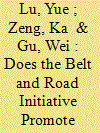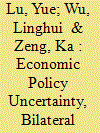| Srl | Item |
| 1 |
ID:
181616


|
|
|
|
|
| Summary/Abstract |
This paper examines the role of the Belt and Road Initiative (BRI) in enhancing political relations between China and its partner countries. We postulate that an international economic cooperation scheme such as the BRI may facilitate commercial exchanges and increase the participating countries’ economic gains. This should generate incentives for these countries to avoid political tensions that may jeopardize mutually beneficial economic exchanges, and to expand the constellation of domestic coalitions in support of cordial diplomatic and political relations. We test the effect of the BRI on bilateral political relations using data on political relations between China and 91 countries along the BRI route between 2006 and 2018. Treating the promulgation of the BRI in 2013 as a policy shock, our difference-in-difference analysis lends substantial support to our hypotheses. Further analyses of the underlying causal mechanisms suggest that the BRI bolsters political relations by strengthening economic ties with partner countries through trade and investment related to economic cooperation.
|
|
|
|
|
|
|
|
|
|
|
|
|
|
|
|
| 2 |
ID:
179935


|
|
|
|
|
| Summary/Abstract |
This paper examines the effect of bilateral investment treaties (BITs) in promoting outward Chinese foreign direct investment (COFDI) in the presence of rising economic policy uncertainty in China’s partner countries. We postulate that the signing of BITs should help stimulate COFDI because the treaties send a credible signal to foreign investors about the host country’s intent to protect Chinese investment, and make it more difficult for the host country to violate its treaty obligations. BITs that contain rigorous investment protection and liberalization provisions, in particular, should be more likely to encourage COFDI as they directly influence Chinese investors’ expectations about the stability, predictability, and security of the host market. However, while BITs generally promote COFDI, host country economic policy uncertainty may also limit their effectiveness. This is because uncertainty tends to undermine investor confidence, trigger capital flows from high- to low-risk countries, and dampen commercial activities. Poisson pseudo-maximum likelihood (PPML) estimation models of the determinants of COFDI to 188 countries between 2003 and 2017 lend substantial support to our conjectures.
|
|
|
|
|
|
|
|
|
|
|
|
|
|
|
|